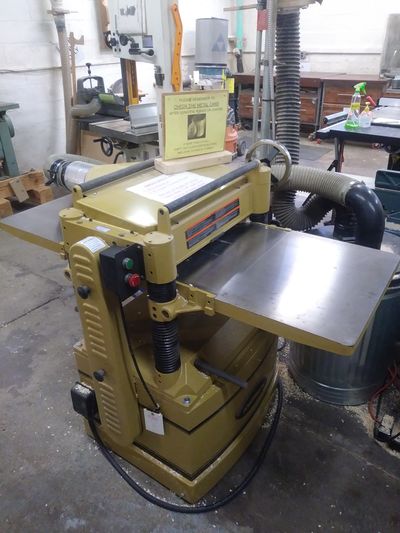Difference between revisions of "20 Inch Planer"
Jump to navigation
Jump to search
(Created page with "=Info and Guides= [https://drive.google.com/open?id=0BzVFua5o5J7YOXlsX2hNNERidU0 Grizzly Planer Manual] Blades: 3x 15 inch HSS blades =Rules= *NO RECLAIMED LUMBER. If you k...") |
|||
| (11 intermediate revisions by the same user not shown) | |||
| Line 1: | Line 1: | ||
= | [[File:powermaticplaner.jpg|400px|thumb]] | ||
=About our machine= | |||
*Model: Powermatic 209HH | |||
*Acquired through fundraising and a matching grant from the Guild of NH Woodworkers! | |||
==Rules== | |||
*NO RECLAIMED LUMBER IN THIS PLANER. Talk to Alex or Jeff about using the portable Dewalt planer we have set aside for this. | |||
*DO NOT RUN NAILS, STAPLES, OR ANY NON-WOOD OBJECTS THROUGH THIS PLANER | |||
*If you put excessive wear on the blades you will be expected to pay for sharpening or new blades. | |||
*Take light passes on harder woods (1/4 turn) | |||
*Each pass should be no more than one turn, or 1/16" deep | |||
= | =Guides and Manuals= | ||
* | *[https://drive.google.com/file/d/1ccqhJzjlQAdRbPZIwRKArEi4xwMfoNc3/view?usp=sharing Powermatic 20" Planer Manual] | ||
* | |||
==How to operate== | |||
#Connect the dust collection hose | |||
#Set the height of the table. Your board should pass just underneath the metal plate in the middle | |||
#If your board is particularly long, set up support rollers on the infeed and outfeed sides to match the current height | |||
#Turn the dust collector on | |||
#Turn the planer on | |||
#Feed your board in straight until the rollers grab it and start to pull it | |||
#Move towards the outfeed side to support the end of it as it comes out | |||
#Once the board has exited the planer, carry it back to the in feed, adjust the height either an eight of a turn or a quarter of a turn | |||
#Make another pass, and repeat steps 6 through 8 until the board is the desired thickness | |||
#Turn off the planer and dust collector. Sweep up any chips around the planer. You can leave the dust collection hose connected | |||
=General Tips and Safety= | |||
*Inspect your board for knots or loose pieces that could come flying out. Remove them before sending through the planer. | |||
*If a workpiece is jammed, it may be because your board is not perfectly flat. Try taking a lighter pass. For more severely distorted boards flatten the board out on one side first. | |||
=Helpful Videos= | |||
*[https://www.youtube.com/watch?v=vxyQJCMLCsI How to Use a Surface Planer | Woodworking] - Howcast on Youtube | |||
=Maintenance= | |||
* | * | ||
Parts: | |||
{{:MainMenu}} | |||
[ | [[Category: Tool]] | ||
[[Category: Wood Shop]] | |||
Revision as of 10:43, 28 October 2020
About our machine
- Model: Powermatic 209HH
- Acquired through fundraising and a matching grant from the Guild of NH Woodworkers!
Rules
- NO RECLAIMED LUMBER IN THIS PLANER. Talk to Alex or Jeff about using the portable Dewalt planer we have set aside for this.
- DO NOT RUN NAILS, STAPLES, OR ANY NON-WOOD OBJECTS THROUGH THIS PLANER
- If you put excessive wear on the blades you will be expected to pay for sharpening or new blades.
- Take light passes on harder woods (1/4 turn)
- Each pass should be no more than one turn, or 1/16" deep
Guides and Manuals
How to operate
- Connect the dust collection hose
- Set the height of the table. Your board should pass just underneath the metal plate in the middle
- If your board is particularly long, set up support rollers on the infeed and outfeed sides to match the current height
- Turn the dust collector on
- Turn the planer on
- Feed your board in straight until the rollers grab it and start to pull it
- Move towards the outfeed side to support the end of it as it comes out
- Once the board has exited the planer, carry it back to the in feed, adjust the height either an eight of a turn or a quarter of a turn
- Make another pass, and repeat steps 6 through 8 until the board is the desired thickness
- Turn off the planer and dust collector. Sweep up any chips around the planer. You can leave the dust collection hose connected
General Tips and Safety
- Inspect your board for knots or loose pieces that could come flying out. Remove them before sending through the planer.
- If a workpiece is jammed, it may be because your board is not perfectly flat. Try taking a lighter pass. For more severely distorted boards flatten the board out on one side first.
Helpful Videos
- How to Use a Surface Planer | Woodworking - Howcast on Youtube
Maintenance
Parts:
Main Menu
| General | Spaces | Tools | Volunteer | Instructors | Community | Communication |
|
- - - - - - |
Slack - member chat |
- - - - - - |
